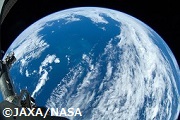| タイトル | Assessing the Importance of the Evaporation-Wind Feedback Mechanism in the Modulation of Simulated Madden-Julian Oscillations |
| 著者(英) | Suarez, Max J.; Lindesay, James; Colon, Edward |
| 著者所属(英) | NASA Goddard Space Flight Center |
| 発行日 | 1998-02-22 |
| 言語 | eng |
| 内容記述 | An examination of simulated Madden-Julian Oscillation (MJO) response to active and suppressed air-sea interactions is made using an aquaplanet model employing a realistic representation of the hydrologic cyle. In general, the evaporation-wind feedback (EWF) results from a coupling between tropical zonal surface wind stresses and evaporation anomalies. Recent observational and theoretical studies have questioned the significance of EWF in sustaining the predominantly wavenumber 1 eastward propagating mode commonly attributed to the interaction between large scale convergence and cumulus-scale convection (conditional instability of the second kind, CISK). To ascertain the nature of the EWF dependence on lower boundary conditions and thus quantify its effect on MJO development, a series of numerical experiments were conducted employing various zonally symmetric sea surface temperature (SST) distributions with active and suppressed EWF mechanisms. Results suggest that a correlation exists between tropical SSTs and the efficacy of the EWF in vertically redistributing heat acquired through surface wind stresses. It has been determined that the removal of the EWF is not a crucial factor in the dampening of the simulated MJO at high equatorial SSTs. The additional energy fed into the developing convective mode by the EWF selectively amplifies higher order wave modes in all numerical experiments thus boosting overall variances in oscillatory responses. |
| NASA分類 | Meteorology and Climatology |
| レポートNO | 98URC049 |
| 権利 | No Copyright |
|

